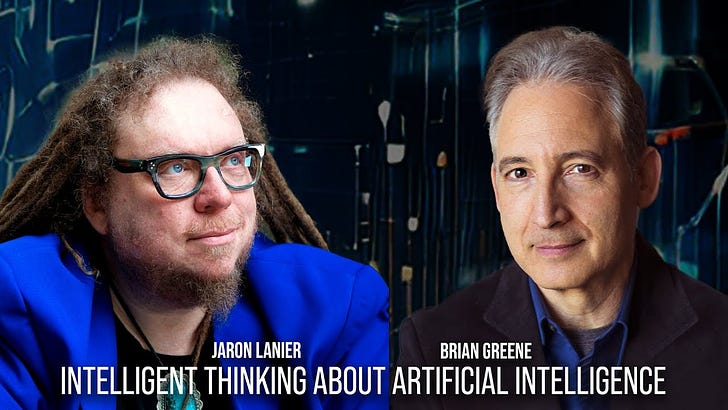Deep listening & reading practice on AI
I watched a wide-ranging conversation today between Brian Greene and Jaron Lanier—Intelligent Thinking About Artificial Intelligence—and it lived up to its title. Context for the conversation is the World Science Festival and the Big Ideas Series supported in part by the John Templeton Foundation. It’s an hour long, posted recently on YouTube so it is quite fresh. I watched the whole thing and today, I’m pointing you to it as a catalyst for your own intelligent thinking on artificial intelligence. It might open up some new directions.
A few weeks ago, in my post “Flecks in the gold pan” (see section 2.b.), I called out a talk Jaron gave at UC Berkeley titled Data Dignity and the Inversion of AI. I called it “great food for thought” and “an encouraging vision.”
Whether you teach, have kids, use ChatGPT and/or DALL-E 2 in your work, research, or creative play, are worried, terrified, or intrigued by the rapid advancing of AI, it’s essential to seek out the intelligent conversations—and they do exist.
I’m guessing you might have seen some of the Sora videos this week, Open AI’s video-generation AI, a text-to-video model. Alberto Romero, another source of intelligent thinking about AI, wrote a 2-part post beginning here, “intended for those of you who know nothing about this AI model. It’s also for those of you who watched the cascade of generated videos that flooded the X timeline but didn’t bother to read the post or the report.”
If you missed Sora this past week, I recommend that you tune in to what it is and consider why people have made a pretty big deal about it. (Part 2 of Romero’s analysis is here and is an important read—his insights on deepfakes and trust are really useful. And all of his links are worth following like this one from @GaryMarcus. If you want to practice one deep read this week, practice on this one.)
And if you missed the challenges that Google’s Gemini (formerly Bard) presented this week, the topic would make for a great exploration with students or teens in your life. Ask them what they know about the Gemini model. Here’s an oversimplified glimpse of the issues with some images from The Guardian’s global technology editor, Dan Milmo. Worth a look. It’s a very short read.
Keeping a complex topic as simple as I can today…
Thanks so much for reading. Be well. And please consider sharing this post with family, friends, teachers, and/or colleagues who might appreciate it.


